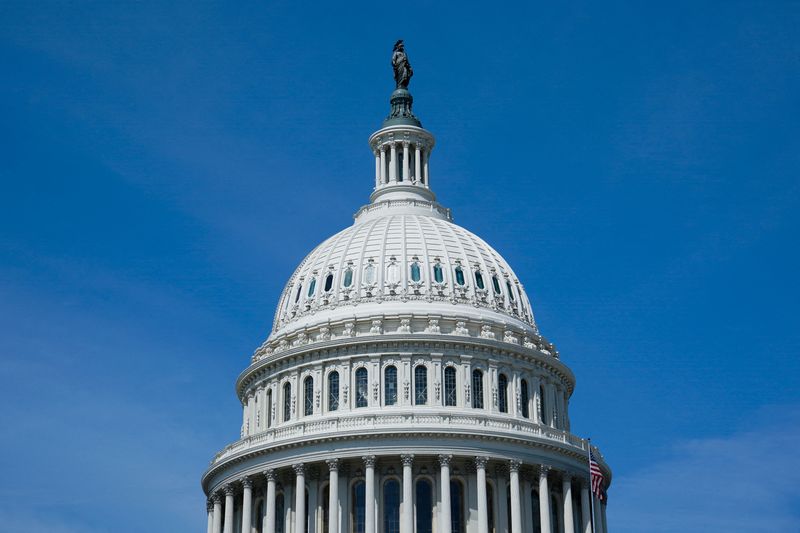By Lewis Krauskopf
NEW YORK (Reuters) – Another source of potential stock market volatility looms in an already tough year for Wall Street: an approaching midterm U.S. elections that will determine which political party controls Congress.
Republicans are expected to make gains in the Nov. 8 vote, setting up a scenario favored by many investors because it would split the government now controlled by President Joe Biden’s Democratic party. Historically, a divided government has been more favorable for stocks than when Democrats control both the House of Representatives and the Senate along with the presidency.
But chances for Biden’s Democrats have been improving, according to betting and polling websites. A closer race has Wall Street worried that Biden may be able to raise taxes on investors and corporations while tightening regulations in areas such as healthcare and banking.
Growing uncertainty ahead of the election “would be a source of unease in the markets potentially,” said Walter Todd, chief investment officer at Greenwood Capital.
As of Sept. 12, Republicans had a 74% chance of gaining control of the House versus 88% on July 13, according to data analysis website FiveThirtyEight. It gave Democrats a 69% chance of controlling the Senate, whereas Republican chances exceeded 50% as recently as late July.
On betting website PredictIt, the cost of a contract forecasting that Republicans will win the House has fallen to 75 cents from over 90 cents in late June. The contract pays $1 if correct.
GRAPHIC: Bets narrow on Reublicans winning the House https://graphics.reuters.com/USA-STOCKS/ELECTION/xmvjoajzrpr/chart.png
GRIDLOCK IS GOOD?
Election concerns have not made much of a ripple in markets so far this year, with investors consumed by the Federal Reserve’s jumbo-sized rate hikes to tame surging inflation.
Worries over the vote could become more prominent as November approaches. Many investors believe divided government makes sweeping reforms less likely to pass, keeping the investment backdrop more stable.
“The market tends to like gridlock,” said Nadia Lovell, senior U.S. equity strategist at UBS Global Wealth Management. “I think it’s fair to say a split government is what investors right now expect and are positioned for.”
Historical data showed that stocks tend to do better in periods of divided government, although investors cautioned that data is limited and markets have generally risen over time regardless of the governmental make-up.
Average annual S&P 500 returns have been 14% in a split Congress and 13% in a Republican-held Congress when a Democrat is in the White House, according to data since 1932 analyzed by RBC Capital Markets. That compares to 10% when Democrats controlled the presidency and Congress.
“A CLOSER CALL” In a report this week, Goldman Sachs analysts said the outcome “looks like a closer call,” with early election results and some polling that “suggest Democrats are in a better position than a few months ago.”
A Democratic Congress would give Biden a better chance to enact more of his agenda, perhaps including proposals to raise top tax rates on corporate, capital gains, or individual income, according to Goldman. Investors generally view such tax measures as unfriendly to markets.
Shares in some industries could be particularly volatile if the election starts to lean toward Democrats. For financial services, a Republican sweep in Congress represents “the most beneficial scenario … as the GOP would resist efforts to constrain the activities of large financial institutions,” UBS analysts said in a report.
Similarly, for healthcare, most legislation affecting the industry “is unlikely to make much headway if either chamber of Congress flips to Republican control,” according to UBS.
The S&P 500 financial sector was down 11.7% this year as of Monday’s close, while the healthcare sector was off 7.1%. The S&P 500 was down 13.8% year-to-date.
Despite the potential for near-term volatility, the broader market has done well in the 12 month-period after midterm votes.
Since 1950, the benchmark S&P 500 has climbed in all 18 12-month periods following the midterm elections, according to LPL Financial “There is political and policy uncertainty heading into midterms that is cleared up after the elections and stocks tend to see a relief rally from that,” said Jeffrey Buchbinder, chief equity strategist at LPL Financial.
(Reporting by Lewis Krauskopf; Editing by Ira Iosebashvili and David Gregorio)
